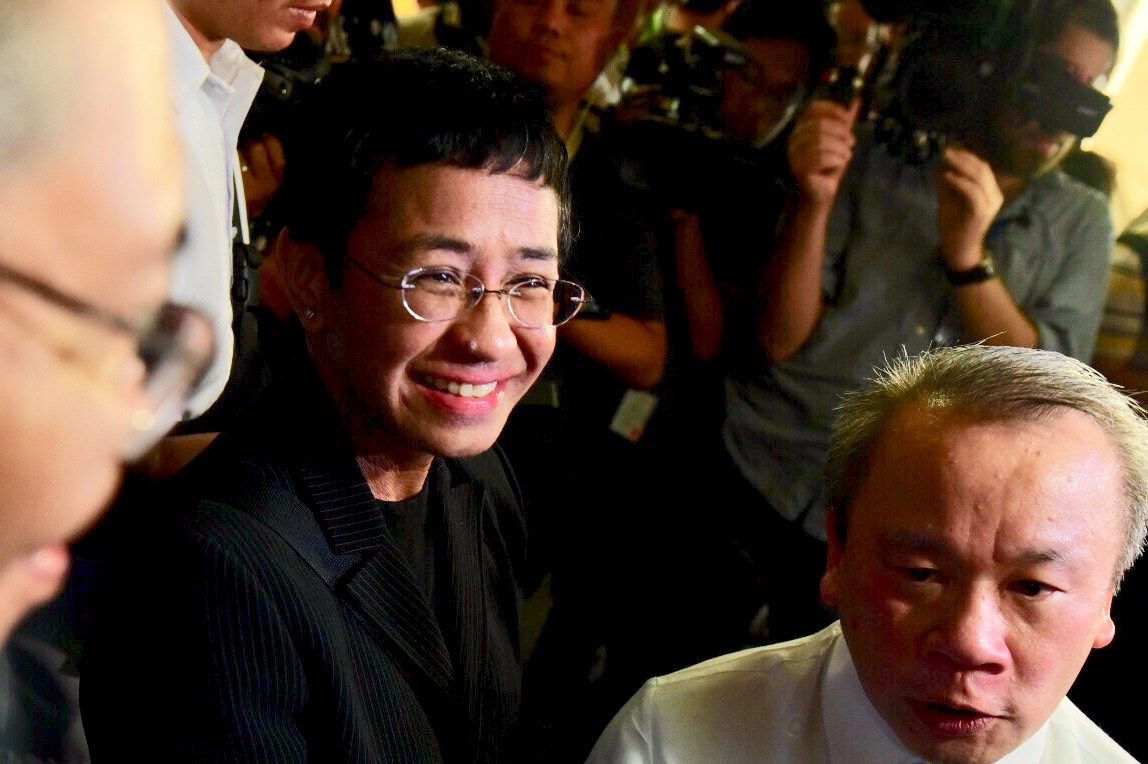SUMMARY
This is AI generated summarization, which may have errors. For context, always refer to the full article.

MANILA, Philippines (UPDATED) – The Manila Regional Trial Court (RTC) Branch 46 has denied the appeal of Rappler CEO and executive editor Maria Ressa to junk her cyber libel case and upheld the novel theory of the Department of Justice (DOJ) that the prescription period for cyber libel is 12 years.
“The instant case was filed in Court on 5 February 2019, which is well within the period of twelve (12) year negating the assertion raised by the Accused that the offense already prescribed,” said Branch 46 Judge Rainelda Estacio-Montesa in her order issued Friday, April 12.
Because the appeal is junked, Montesa said the arraignment of Ressa and her co-accused, former Rappler researcher-writer Reynaldo Santos Jr, will proceed as scheduled on Tuesday, April 16, at 8:30 am.
Supreme Court: Not a new crime
The ordinary libel, or libel as punished by Article 355 of the Revised Penal Code (RPC), says “the crime of libel or other similar offenses shall prescribe in one year,” meaning one cannot be sued for libel one year after a supposedly libelous story is published.
The subject article of the cyber libel charge was published in 2012, which the DOJ said was also “republished” in 2014. The complaint was filed by businessman Wilfredo Keng only in October 2017. (READ: Maria Ressa arrest tests the bounds of Philippine cyber libel law)
The cyber libel defined under the 2012 Cybercrime Prevention Act did not explicitly provide a prescription period.
However, the Supreme Court said in a decision in 2014 that cyber libel is “not a new crime but is one already punished under Article 353 (of the RPC).”
The appeal filed by Ressa used that pronouncement by the Supreme Court in arguing the prescription period.
But Judge Montesa shared the DOJ’s novel theory that cyber libel has a 12-year prescription period under Act No. 3326.
The SC said that the penalty to be imposed on cyber libel should be one degree higher than that in the Revised Penal Code.
The DOJ said that Cybercrime Law is a special law, and special laws have their own prescription period under Act No. 3326.
“Considering that one degree higher of prision correccional in its minimum and medium periods is prision correccional in its maximum period and prision mayor in its minimum period or 4 years, 2 months and 1 day to 8 years, the offense shall prescribe after TWELVE (12) YEARS following the provision of Section 1 of Article 3326,” said Judge Montesa.
This interpretation has been called alarming by lawyers who challenged the Cybercrime Law in 2012 when it was passed. It would open anyone who publishes anything to vulnerability of suit for 12 years post-publication.
Rappler counsel Theodore Te, former SC spokesman, said this case might just prompt a revisit of the law by the High Court.
Other arguments
In the appeal by Ressa prepared by Te, who represents the Free Legal Assistance Group (FLAG), it was pointed out that there was a Temporary Restraining Order (TRO) against the Cybercrime Law when the article was published.
Although Ressa insisted that even the theory of republication is invalid, her appeal stressed that on February 19, 2014, the supposed republication date, the Supreme Court-issued TRO was still in effect, meaning no law concerning that supposed crime was applicable then.
Te said in the appeal that even though the SC came out with a decision on February 11, 2014, or 8 days before the supposed republication of the questioned article, the High Court only resolved motions for reconsiderations with finality on April 22, 2014.
“During the duration of this TRO – October 9, 2012 continuously until April 22, 2014 – there was effectively no RA 10175. That is the legal, practical, and actual effect of the Supreme Court’s TRO. The alleged republication was done on February 19, 2014, when the TRO was still in effect,” said the appeal.
Judge Montesa rejected this and said: “The TRO merely suspends the implementation and enforcement of RA 10175 (Cybercrime Law), so that crimes committed during the said period cannot be prosecuted. However, it did not suspend its effectivity.”
“So while crimes committed during the said period cannot be prosecuted during the effectivity of the TRO they may be prosecuted after the lifting of the same just like what is done in this case,” the judge added.
The cyber libel charge against Ressa is one of the 8 active court charges against her, and of the overall 11 cases against Rappler, its directors and staff so far.
‘Danger to freedom of expression’
Human rights lawyer and now senatorial candidate Chel Diokno said the ruling, by adopting the justice department’s theory that cyber libel prescribes only after 12 years, will affect no only Ressa, Rappler, and the President’s critics.
“Because of the nature of online expression, this poses a danger to online journalists and to any Filipino who exercises freedom of expression online,” Diokno said in a statement on Monday.
“The courts are supposed to protect us from the vindictive use of State power, not tolerate or condone it. This is a sad day for judicial independence,” he added. – Rappler.com
Add a comment
How does this make you feel?
There are no comments yet. Add your comment to start the conversation.